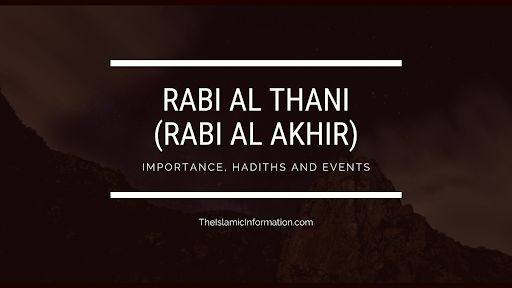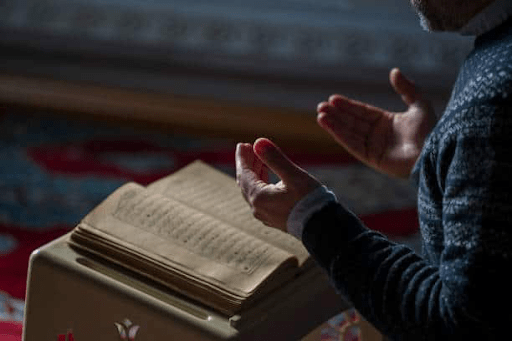Rabi' al-Thani: A Month of Blessings and
Reflection
- Home
- Islamic Blogs
- Rabi' al-Thani
The fourth month of the Islamic Hijri calendar is Rabi Al-Thani. Also referred to as Rabi Al-Aakhir, this month symbolizes the conclusion of the spring season and translates to “the second spring” or “the last spring.” Like other Islamic months, its name reflects the tradition of naming months based on significant events, weather, or seasonal changes, which were prevalent in pre-Islamic Arabia.
The months of the Islamic calendar hold deep spiritual significance for Muslims worldwide. More than just a way to mark the passing of time, the Islamic calendar serves as a reminder of the meaningful customs and traditions that have shaped the rich history of Islam. Each month within the calendar of Islam has its own unique importance, reflecting both historical events and spiritual lessons.
Rabi Al-Thani stands out as one of the noteworthy Muslim months, thanks to its fascinating historical origins. Around 412 AD, during the leadership of Kilab bin Murra, the fifth grandfather of the Prophet Muhammad (peace be upon him), this month was officially named. This highlights how the names of the Islamic year months were influenced by cultural, historical, and environmental factors.
The Islamic month of Rabi Al-Thani encourages reflection on the deeper meanings of the seasons and the traditions tied to them. Just as this month signifies the transition of spring, it symbolizes growth, renewal, and the importance of aligning one’s life with faith and devotion. Muslims are reminded of the cyclical nature of time, as marked by the Islamic calendar, and are encouraged to strengthen their connection with Allah while drawing inspiration from the rich history embedded in the months of the Islamic calendar.
By appreciating the spiritual and historical significance of Rabi Al-Thani, believers gain a deeper understanding of the Islamic year months and their profound role in shaping the journey of faith.
How Many Islamic Months Are There?
There are exactly 12 Islamic months:
Makkah2Madinah (M2M) is a UK-registered travel agency specializing in reliable and comfortable Umrah taxi services for pilgrims from the UK and Pakistan. With over 15 years of experience, we offer a fleet of modern vehicles and professional drivers to ensure a smooth and safe journey to Makkah, Madinah, and other important Islamic sites.
Our services are designed with your comfort and safety in mind. We offer affordable rates, 24/7 availability, and an easy online booking process, making it simpler tan ever to secure your Umrah taxi.
To book your Umrah taxi, simply visit our Book Your Umrah Taxi page, select the vehicle that best suits your needs, and provide your travel details. Once your booking is confirmed, you can complete your payment securely online. For more information on the booking process, visit our How to Book Your Umrah Taxi page.

Even though Rabi’ al-Thani is not as commonly observed as other Islamic months like Ramadan or Dhul Hijjah, it is always very important to Muslims worldwide. While some Islamic sects and localities commemorate special customs and activities throughout this month, many Islamic communities use this time to strengthen their commitment by praying and carrying out good deeds. Some Sufi groups, for instance, commemorate the lives and teachings of well-known Islamic scholars and saints who helped expand Islam and preserve its teachings.
A battle known as “Furu” was fought at Buhraan in 3 A.H., and another battle was fought on the 9th of Hijri. Prophet Muhammad (PBUH) did not participate in the Battle of Sariyyah, so he appointed one of His companions, Ali Ibn Abi Talib (RA), as a colonel for the war on His behalf.

The daily recital of the Holy Qur’an is highly recommended during this holy month. The wird, or continuous recitation of “Istaghfaar,” which translates to “Depreciation,” is typically regarded as the second crucial phase. Thirdly, the Raza (Contentment) of Allah Almighty (SWT) may also benefit from the offering of Nawafil. It is suggested that emphasis be placed on reciting Surah Mariam, Fatiha, Taha, Muzammil, and Ayatal Kursi.
Rabi Al Thani is superior because it allows one to have Allah (SWT) accept their duas throughout this month. Additionally, Muslims are seen fervently praying to our Holy Prophet’s Sadqua (Sake) (PBUH).

Muslims are always urged to intensify their actions of devotion, such as
There are no particular acts of worship that are just required for Rabi’ al-Thani. Regardless of the season or time of year, the Prophet (ﷺ) stressed the significance of consistently performing good deeds:
Muslims are free to participate in optional prayers, particularly the Duha (forenoon prayer) and Tahajjud (late night prayer). These prayers provide a means of establishing a stronger bond with Allah and asking for His mercy and direction.
Throughout the year, it is strongly advised to fast, especially on Mondays, Thursdays, and the White Days
(the 13th, 14th, and 15th of the lunar month). It is a means to cultivate self-discipline, purify the soul, and pursue intimacy with Allah.
“Fasting is a shield with which a servant protects himself from the Fire.”
(Sahih Muslim 1151)
Acts of kindness are continuously rewarded, and Rabi’ al-Thani is a great moment to carry out this admirable deed. Charity is strongly promoted in Islam, whether it takes the form of monetary donations or deeds of compassion.
“The believer’s shade on the Day of Resurrection will be his charity.”
(Tirmidhi, Hadith 604)
Two essential components of Islamic devotion are dhikr (memory of Allah) and dua (supplication). Throughout the month, Muslims should strive to remember Allah more and ask for His blessings, mercy, and guidance.
“Those who have believed and whose hearts are assured by the remembrance of Allah. Unquestionably, by the remembrance of Allah hearts are assured.”
(Quran, 13:28)
Makkah2Madinah is a UK-registered travel agency proudly serving Muslims from both Pakistan and the United Kingdom. Since our inception, we have been dedicated to providing personalized care to every traveler. Whether you are young or old, a first-time pilgrim, or a seasoned traveler, our knowledgeable guides, well-versed in Islamic history, ensure a spiritually uplifting journey from the moment you depart until you return home.
At Makkah2Madinah, we also offer reliable Umrah taxi services to make your pilgrimage stress-free. Whether you need transportation from Jeddah to Makkah or between the holy cities of Makkah and Madinah, our modern fleet and experienced drivers ensure a smooth and punctual ride. With our Pay After Service option, you can experience the quality of our transportation services before making any payment, giving you added peace of mind and convenience. To learn more about our services and explore how we can assist you on your spiritual journey, click here for detailed information.
Performing Umrah for the first time is a profound and transformative experience. To ensure a fulfilling pilgrimage, it is crucial to understand each step, from entering the state of Ihram and reciting the Talbiyah, to performing Tawaf, completing Sa’i, and concluding with Tahalul. For an in-depth guide and valuable tips, visit our blog on How to Perform Umrah [INSERT LINK], where you will find everything you need to know for your spiritual journey.
The conclusion of Rabi’ al-Thani serves as a reminder of the spiritual significance and historical events associated with the month. As it draws to a close, Muslims are encouraged to reflect on their connection with Allah, renew their intentions, and continue their journey of self-improvement and worship. The month’s end is an opportunity to express gratitude for blessings, seek forgiveness, and prepare for the continued spiritual growth in the months ahead. It highlights the cyclical nature of the Islamic calendar, where every month carries unique lessons and chances for renewal.
The word “Rabi” means “spring” and Al-thani means “the second” in the Arabic language, so “Rabi’ al-Thani” means “the second spring” in Arabic. As the Islamic calendar is a purely lunar calendar, the month naturally rotates over solar years, so Rabīʽ al-Thani can fall in spring or any other season.
Two major events in Rabi Al Thani were the Battle of ‘Furu’ at Buhraan in 3 A.H and another battle in 9 A.H. The Prophet (ﷺ) did not take part in this battle and allocated one of his companions, Hazrat Ali Ibn Abi Talib (رَضِيَ ٱللَّٰهُ عَنْهُ), as Colonel on his behalf.
Rabi’ al-Thani offers an opportunity for meaningful private acts of worship, such as Sunnah prayers, charity (Sadaqah), fasting, and reflection, even though it does not include any required religious observances.
Rabi al-Thani is the fourth month in the Islamic (Hijri) calendar and is also referred to as Rabi al-Akhirah. ‘Rabi’ translates to ‘Spring’, while ‘Thani’ and ‘Akhirah’ respectively translate to ‘The second’ and ‘The last’, referring to the end of the spring season.